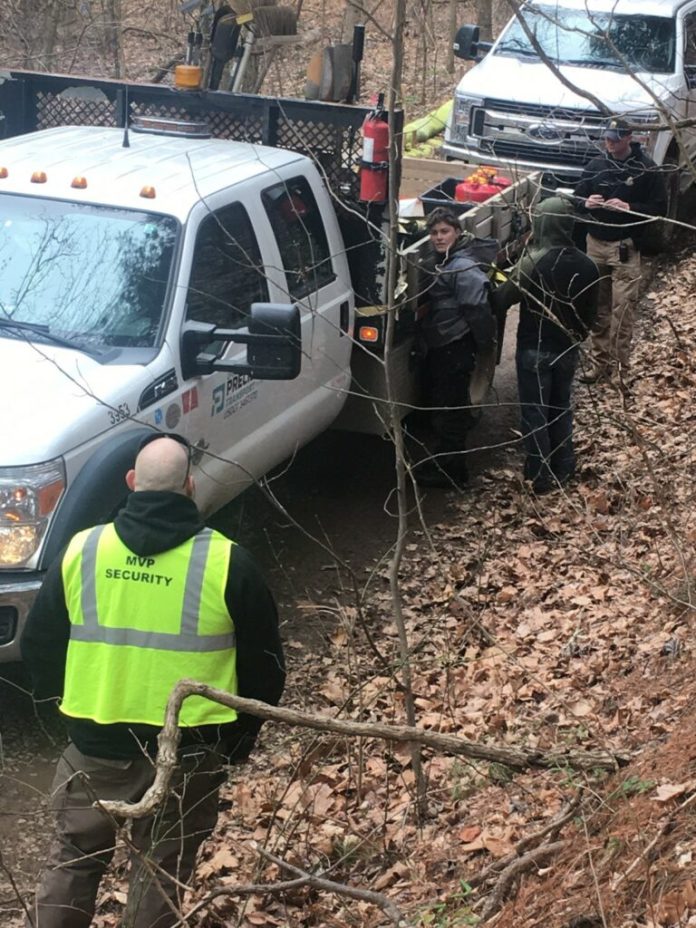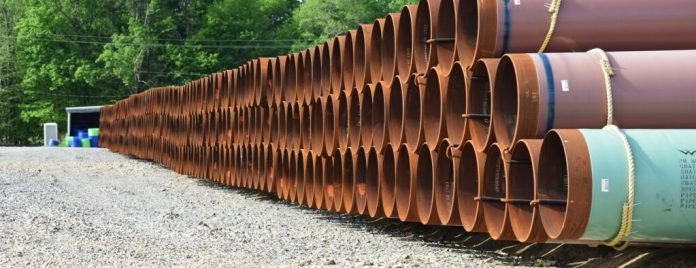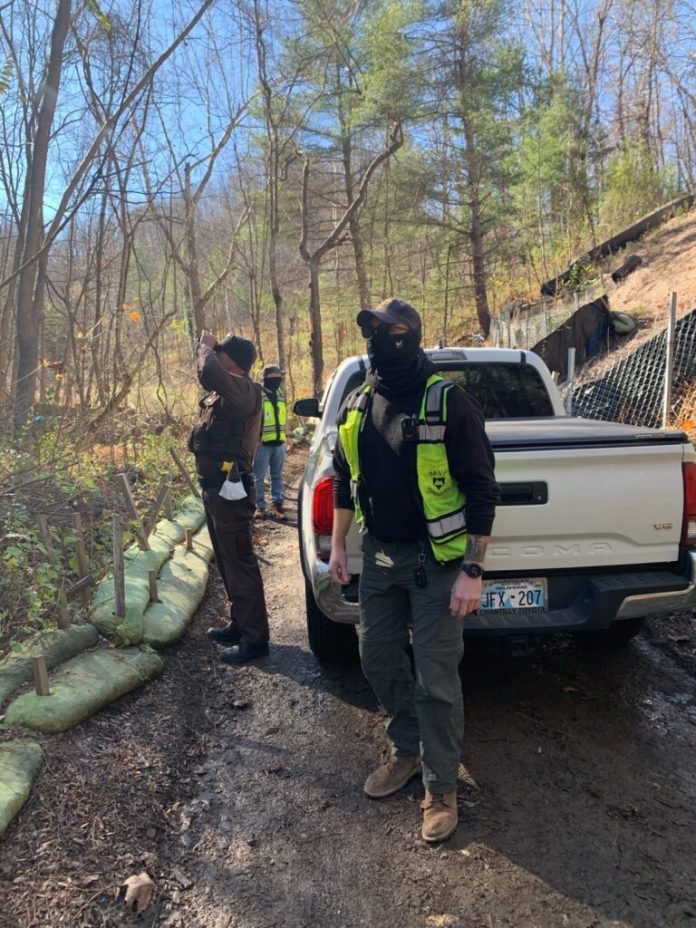Leighton Security Services, a private security company accused of working without a license during construction of the controversial Dakota Access pipeline, is facing similar allegations in Virginia.
The complaint against Leighton is one of two recently filed against private companies providing security for the Mountain Valley pipeline, a planned 300-mile pipeline that would carry fracked gas from northwestern West Virginia, through pristine mountain streams and Appalachian forests, to the Transcontinental Gas Pipeline Company’s (Transco) compressor station in southern Virginia.
The complaints were filed anonymously in January with the state’s Department of Criminal Justice Services (DCJS) and shared with DeSmog. Virginia officials have confirmed to DeSmog that investigations are ongoing.
According to one complaint, Leighton has subcontracted MVP security work to another unlicensed firm, The North Group, Inc., as well as to two unlicensed individuals. A second complaint seeks to hold The North Group directly responsible for operating without a license.
Leighton owner James Kevin Mayberry denied the allegations to DeSmog, but acknowledged that the company was hired to provide security by Precision Pipeline, a business subcontracted by MVP to build the pipeline, and in turn subcontracted the work to The North Group.
“In most cases, a security license is required to subcontract with another company,” Leon D. Baker, Jr., the director of Virginia’s licensing agency, said in email. “If they do, the subcontractor must also be licensed by DCJS.”
The North Group co-owner Steven Hernandez has acknowledged to DeSmog that TNG and Leighton “have a relationship minimally.” But he denies that TNG has worked unlicensed in Virginia. “The North Group uses licensed subcontract vendors and performs work within accordance with all state and federal regulations,” said Hernandez, who declined to name the subcontractors used by TNG.
A recent posting to the online job board Indeed.com appears to be from The North Group. The opening is for an unarmed protection agent in Roanoke, Virginia. Jobs in Michigan and Minnesota, where TNG is licensed to provide security services, are also listed. Hernandez did not respond to questions regarding the postings.

The Mountain Valley pipeline has drawn fierce opposition from landowners and environmental activists in both West Virginia and Virginia, where police recently forcibly extracted and arrested two protesters from a tree sit after they blocked construction for two and a half years.
Emily Satterwhite, a vocal pipeline opponent who says she has drawn the attention of private security agents at rallies and protests against the pipeline, finds the allegations against Leighton and TNG alarming. “To know that there are people like that who feel like they’re operating — and are operating — under the radar, it’s infuriating, but it’s also frightening,” she said.
Satterwhite, an associate professor of Appalachian studies and popular culture at Virginia Tech, says men in unmarked white trucks have used “intimidation tactics” by following her and other pipeline opponents around town at all hours.
Satterwhite doesn’t know who the men are. But the situation gives her pause. “If we don’t even know who they are and who they’re working for, and they have no licensing concerns, what might they do?” she said. “If I had a complaint about my treatment, where would I go and who would respond?”
Little accountability for pipeline security firms, new crackdowns for protesters
The Virginia allegations against Leighton highlight how inconsistently states regulate and monitor private security firms that cater to the fossil fuel industry. Potential penalties are seldom hefty enough to deter companies that have been caught violating licensing regulations in one state from skirting licensing requirements in another. Many substantiated complaints are never prosecuted by state authorities.
“Presently, there is no universal manner in which security companies and their individual security practitioners are handled from state to state,” said Fabian Blache III, the director of Louisiana’s private security licensing board, and president of the International Association of Security and Investigative Regulators (IASIR). “When you have the ones that just blatantly work without a license and you’re constantly chasing them around from place to place to place, it’s very frustrating.”

While some states require both the firm and its individual employees to be licensed, others limit the requirement to the company only. A handful allow any private security firm with a general business license to operate with no further oversight. The lack of consistency between states can be confusing to firms, said Blache, but he contended that most companies do their best to adhere to the law.
The penalties for operating without a license vary from state to state, but tend to be relatively light. While it’s a felony in Michigan, punishable by up to four years in prison, fines of up to $1,000, or both, Virginia considers it a misdemeanor punishable by up to a year in prison, a fine of up to $2,500, or both. Licensing violations are also misdemeanors in North Dakota, punishable by up to 30 days in prison, a fine of up to $1,500, or both.
While state licensing rules for private security companies seem to have changed little in the years since the violent attacks by police and private security on Dakota Access pipeline opponents in 2016-17, multiple states have decided to criminalize anti-pipeline protests. At least 20 states have passed or introduced harsh new laws that make it a felony to protest at pipeline construction sites and other critical infrastructure. Individuals found guilty face felony convictions, long prison sentences, and fines running into the thousands of dollars. Critics of these laws, which have often been based on model legislation developed by the fossil fuel-friendly American Legislative Exchange Council, say they infringe on the First Amendment right to protest.

Blache believes that the key to forcing companies to comply with licensing laws is to ensure there are criminal penalties for offenders, and to empower state regulatory agencies to conduct active enforcement. “If you have criminal penalties in your statute, and your individual inspectors have the authority to arrest, it’s a game-changer,” he said, “because you can now show up through the inspection, determine [a company’s] unlicensed, and cuff them and take them.”
The information that private security firms file with state regulators is not regularly shared across states. While some states have easily searchable databases, others do not, making it difficult for licensing agencies in other states or the public to research a company’s history. Regulators considering license applications are often forced to conduct time — and resource — intensive investigations, piecing together a company’s history one state at a time.
Firms trying to shirk a dubious history sometimes change names, owners, or registered agents.
“If a regulator gets an application from somebody, you have to really work it backwards,” Blache said. “You have to start with the individual and do your research on the person … you’ve got to scrub social media, Linked In, Facebook, Instagram, all these different tools that are out there to find the connectivity points between the individuals in the previous companies.”
Leighton licensing questions span five states
Leighton, which is based in Texas, has also been accused of operating without a license in North Dakota, Michigan, Iowa, and Ohio.
It was a Leighton employee who pointed an AR-15 rifle at Indigenous water protectors blocking construction of the Dakota Access pipeline in 2016. The scene, captured on a widely circulated video, was one of hundreds of brutal assaults that militarized private security forces used against the activists and their supporters.
In the wake of those protests, North Dakota licensing regulators investigated and filed separate administrative complaints against Leighton and another private security firm named TigerSwan for operating without state licenses. Although Leighton never admitted to any wrongdoing, in 2019 the firm agreed to pay the state $43,500 in administrative fees and costs. In exchange, the state agreed to drop the complaint. The agreement stipulates that if Leighton applies in the future for a private security license in North Dakota, the board can consider “all available information, including actions taken as part of the Dakota Access Pipeline construction and protests as part of its licensure determination.”
In Iowa, Leighton subcontracted with Precision Pipeline to provide “armed security by mobile, roving patrols,” despite not being licensed in the state, according to internal situation reports compiled by TigerSwan. Leighton was “basically coordinating with multiple law enforcement agencies to provide off-duty law enforcement personnel through the various departments,” stated one of the reports.
Iowa regulators confirmed to DeSmog that Leighton is not licensed to provide security in that state.
“Private security guards are used by a lot — by far the majority — of the critical infrastructure in this country,” said Laurel Rudd, executive director of IASIR, the association of state regulators. “Do you really not want to know the background of the person who you’re hiring, whether it be criminal background or whether it be terrorist affiliation?”
Michigan: A lesson in bureaucracy
Sometimes it takes doggedly persistent citizens to force states to investigate.
In 2017, Michigan resident John Machowicz filed a complaint against Leighton with state regulators, alleging that the company was providing security services for the Rover pipeline project. Now completed, the pipeline carries fracked gas more than 700 miles through West Virginia, Pennsylvania, Ohio, and Michigan.
“There have been several times when a security guard has gotten out of the car and approached us about our legal right to document the pipeline project,” Machowicz, a pipeline opponent, told state officials at the time. “We are concerned that Leighton Security Services will get more aggressive like the security firm Tiger Swan from the Dakota Access pipeline.”
Leighton denied it was doing the work itself and told investigators it had subcontracted with Professional Solutions Group (PSG) to provide security personnel. In 2020 PSG merged with The North Group, the company named with Leighton in the Virginia complaints. Both PSG and TNG are licensed to provide security services in Michigan.
Leighton also contracted with the Livingston County Sheriff’s Office, paying the county $60 an hour — at least $300,000 in total — to provide deputies to fill shifts patrolling pipeline construction sites.
Initially, the Michigan Department of Licensing and Regulatory Affairs (LARA) found the complaints unsubstantiated, because the state does not require firms that subcontract work to be licensed.
Machowicz was undeterred. He next sent regulators photographs showing Rover pipeline security personnel with “Leighton Security” emblazoned on their vests, along with other information that he said proved Leighton didn’t just subcontract, but directly employed individuals to provide private security.
Machowicz also sent LARA troubling body camera footage, obtained through a public records request. In one recording, two security men at a Rover pipeline site in 2017 told a county sheriff’s deputy that they worked for private companies, naming PSG and Leighton. “My boss is a state trooper in Illinois,” the Leighton employee added, referring to Gary Washburn, a full-time lieutenant with the Illinois Secretary of State Police who was also employed by Leighton as an operations manager.
Another showed a sheriff’s deputy responding to a call from a local resident in Washtenaw County, Michigan, about a suspicious vehicle parked for hours in front of their house. The man inside the vehicle identified himself as “part of the Rover pipeline, with Leighton Security.” Such situations were not uncommon at the time, Machowicz told LARA. “Residents commonly found themselves scared away from public spaces by security personnel” and treated like criminals,” even though they “limited their activities to peaceful documentation.”

In 2019, state regulators re-opened their investigation and this time substantiated the allegations. But instead of justice, Machowicz says, he’s gotten a lesson in bureaucracy.
Under Michigan law, providing private security service while unlicensed is a felony punishable by up to four years in prison, fines of up to $1,000, or both. But like agencies in many states, LARA isn’t authorized to pursue criminal charges. So state officials handed the Leighton case off to officials in Washtenaw and Livingston counties, where the work had occurred.
The prosecutor in Livingston County — where the sheriff’s office was on Leighton’s payroll — shipped the case back to the state licensing agency, insisting that LARA’s investigation was incomplete and provided insufficient evidence that a crime had been committed. In Washtenaw County, the prosecutors’ office told LARA it didn’t have the personnel to investigate and suggested the agency forward the case to the sheriff’s office.
A detective with the Washtenaw County Sheriff’s Office told Machowicz in late 2019 that it was “not in a position to investigate this matter appropriately.” He suggested that Machowicz ask the state attorney general’s office or state police to step in.
A spokesperson with the Michigan attorney general’s office confirmed that it is investigating Leighton’s operations in the state, but could not provide further information because the matter is ongoing.
In the process of defending itself against the Michigan allegations, an attorney for Leighton attempted to discredit a second complainant by telling state investigators that the individual knew nothing about what had happened in Michigan because he had only worked for Leighton in Ohio. However, Leighton has never held a private security license in Ohio, according to Jay Carey, a spokesman for theOhio Department of Public Safety.
Unlike Michigan, Ohio prohibits unlicensed firms from bidding on or accepting a contract to provide security services regardless of whether it subcontracts to another company.
“They’re soliciting business in this field, so they must be licensed,” Carey said.
Security and insecurities
Back in Virginia, Satterwhite said surveillance by MVP security left her feeling unsafe in her own community.

“For at least a year, probably more, maybe two, I was just on edge all the time, tense, looking to see is that white vehicle driving past my house a security vehicle? Is that white vehicle that passed me on my walk from my house to campus where I work a security vehicle?” Satterwhite said.
While there is no guarantee that licensed security companies will operate ethically, Satterwhite said companies that don’t bother to obtain licensure pose a much bigger danger to the public.
“What’s somebody going to do if they don’t even have a license at risk?”
Related posts:
Views: 0
 RSS Feed
RSS Feed

















 April 18th, 2021
April 18th, 2021  Awake Goy
Awake Goy 

 Posted in
Posted in  Tags:
Tags: 
















